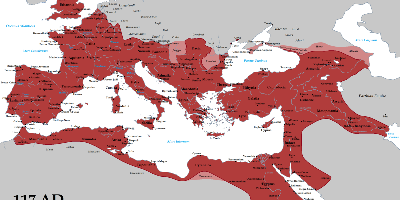1 janv. 167 av. J.-C. - Third Macedonian War Ends
Description:
Aemilius sent his son, Quintus Fabius Maximus, who had returned from Rome, to sack two cities: Agassae, which revolted after it had surrendered to the consul and asked for an alliance with Rome, and Aeginium, which refused to believe the Roman victory and killed some Roman soldiers who entered the town. Lucius Postumius was sent to sack Aeniae "because of its obstinacy".Commissioners were sent to Macedon and to Illyria. Livy wrote that the senate resolved that the Macedonians and Illyrians should be free "so that it might be clear to all the world that the arms of Rome did not carry slavery to the free, but on the contrary freedom to the enslaved; and also that amongst those nations which enjoyed liberty, the security and permanence of their liberty rested under the protection of Rome." This had to do with the self-image the Romans liked to have and with propaganda, rather than reality. The contracts for working the rich mines of Macedon and the leases of the royal domains were scrapped and were put under Roman tax collectors. The pretext was that without them “the law lost its authority or the subjects their liberty” and that the Macedonians were unable to work the mines themselves because those in charge would line their pockets and this could cause unrest. Ironically, the Roman tax collectors became notorious for lining their pockets. The Macedonian national council was abolished with the excuse that this was intended to prevent a demagogue from flattering the “mob” and turn the freedom granted by the Romans into a “dangerous and fatal licence.” Macedon was to be divided into four republics, each with its own council which would have to pay Rome a tribute which was half of what used to be paid to the king. The same regulations applied to Illyria. More definite arrangements were to be made by the commissioners.
When the commission arrived from Rome Aemilius gave notice for the representatives of all the cities to assemble at Amphipolis and bring all the documents they had and all the money due to the Royal treasury. A conference was held and there was such a display of pomp and power that Livy wrote that it “might have even appalled the allies of Rome.” It was declared that the Macedonians were to be free and retain their fields and cities and elect their officials. Then the partition, the borders of the four cantons and the tribute were announced. Aemilius designated the four capitals. Intermarriage between people of different cantons and the possession of houses or land in more than one canton were banned. The gold and silver mines were not allowed to be mined, but the iron and copper ones were. Importation of salt and cutting of wood for domestic shipbuilding or allowing others to do so were forbidden. The cantons bordering other nations were allowed to have border troops.
The Romans also used their victory to increase their control over the whole of Greece by supporting the pro-Roman factions around Greece. Their supporters had come to the conference from all over Greece. They made allegations that many of those who had supported Perseus in their cities and states had fostered hostility towards Rome, claimed that maintaining loyalty to Rome in their states required crushing them, and gave lists of names. The commissioners decided that the people on the list had to go to Rome to make their defence. Livy wrote that the pro-Romans were inflated “to an insupportable pitch of insolence.” In Macedon everyone who had been in the king's service was sent to Italy with their children over fifteen.
Aemilius sent Nasica and his son, Quintus Fabius Maximus Aemilianus, to ravage the areas of Illyria which had helped Perseus.
Ajouté au bande de temps:
Date:
1 janv. 167 av. J.-C.
Maintenaint
~ Il y a 2194 ans
